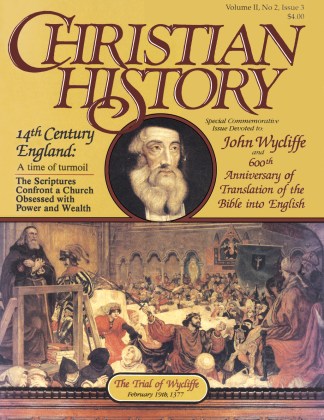Since Geoffrey Chaucer and John Wycliffe were contemporaries, scholars debate whether Chaucer’s “Parson’s Tale” in the Canterbury Tales is a disguised Wycliffite sermon. The Parson is introduced in the epic with the words, “I smelle a Lollere in the wynd.” Some feel The Parson is Chaucer’s tribute to Wycliffe. The following is from the Prologue to the Canterbury Tales and is adapted from the original Midland English by Ruth M. Stauffer.
A kindly Parson took the journey too.
He was a scholar, learned, wise, and true.
And rich in holiness though poor in gold.
A gentle priest: whenever he was told
That poor folks could not meet their tithes that year,
He paid them up himself; for priests, it’s clear
Could be content with little, in God’s way.
He lived Christ’s Gospel truly every day,
And taught his flock, and preached what Christ had said.
And even though his parish was widespread,
With farms remote, and houses far asunder,
He never stopped for rain or even for thunder;
But visited each home where trouble came:
The rich or poor to him were all the same.
He always went on foot, with staff in hand;
For as their minister, he took this stand:
No wonder that iron rots if gold should rust!
That is, a priest in whom the people trust
Must not be base, or what could you expect
Of weaker folk? The Shepherd must perfect
His life in holiness that all his sheep
May follow him, although the way is steep,
And win at last to heaven. Indeed, I’m sure
You could not find a minister more pure.
He was a Christian both in deed and thought;
He lived himself the Golden Rule he taught.
Copyright © 1983 by the author or Christianity Today/Christian History magazine. Click here for reprint information on Christian History.










